- Home
- Virginia Woolf
Complete Works of Virginia Woolf Page 16
Complete Works of Virginia Woolf Read online
Page 16
“A great encampment of tents they might be,” said Hewet, looking in front of him at the mountains. “Isn’t it like a water-colour too — you know the way water-colours dry in ridges all across the paper — I’ve been wondering what they looked like.”
His eyes became dreamy, as though he were matching things, and reminded Rachel in their colour of the green flesh of a snail. She sat beside him looking at the mountains too. When it became painful to look any longer, the great size of the view seeming to enlarge her eyes beyond their natural limit, she looked at the ground; it pleased her to scrutinise this inch of the soil of South America so minutely that she noticed every grain of earth and made it into a world where she was endowed with the supreme power. She bent a blade of grass, and set an insect on the utmost tassel of it, and wondered if the insect realised his strange adventure, and thought how strange it was that she should have bent that tassel rather than any other of the million tassels.
“You’ve never told me you name,” said Hewet suddenly. “Miss Somebody Vinrace. . . . I like to know people’s Christian names.”
“Rachel,” she replied.
“Rachel,” he repeated. “I have an aunt called Rachel, who put the life of Father Damien into verse. She is a religious fanatic — the result of the way she was brought up, down in Northamptonshire, never seeing a soul. Have you any aunts?”
“I live with them,” said Rachel.
“And I wonder what they’re doing now?” Hewet enquired.
“They are probably buying wool,” Rachel determined. She tried to describe them. “They are small, rather pale women,” she began, “very clean. We live in Richmond. They have an old dog, too, who will only eat the marrow out of bones. . . . They are always going to church. They tidy their drawers a good deal.” But here she was overcome by the difficulty of describing people.
“It’s impossible to believe that it’s all going on still!” she exclaimed.
The sun was behind them and two long shadows suddenly lay upon the ground in front of them, one waving because it was made by a skirt, and the other stationary, because thrown by a pair of legs in trousers.
“You look very comfortable!” said Helen’s voice above them.
“Hirst,” said Hewet, pointing at the scissorlike shadow; he then rolled round to look up at them.
“There’s room for us all here,” he said.
When Hirst had seated himself comfortably, he said:
“Did you congratulate the young couple?”
It appeared that, coming to the same spot a few minutes after Hewet and Rachel, Helen and Hirst had seen precisely the same thing.
“No, we didn’t congratulate them,” said Hewet. “They seemed very happy.”
“Well,” said Hirst, pursing up his lips, “so long as I needn’t marry either of them—”
“We were very much moved,” said Hewet.
“I thought you would be,” said Hirst. “Which was it, Monk? The thought of the immortal passions, or the thought of new-born males to keep the Roman Catholics out? I assure you,” he said to Helen, “he’s capable of being moved by either.”
Rachel was a good deal stung by his banter, which she felt to be directed equally against them both, but she could think of no repartee.
“Nothing moves Hirst,” Hewet laughed; he did not seem to be stung at all. “Unless it were a transfinite number falling in love with a finite one — I suppose such things do happen, even in mathematics.”
“On the contrary,” said Hirst with a touch of annoyance, “I consider myself a person of very strong passions.” It was clear from the way he spoke that he meant it seriously; he spoke of course for the benefit of the ladies.
“By the way, Hirst,” said Hewet, after a pause, “I have a terrible confession to make. Your book — the poems of Wordsworth, which if you remember I took off your table just as we were starting, and certainly put in my pocket here—”
“Is lost,” Hirst finished for him.
“I consider that there is still a chance,” Hewet urged, slapping himself to right and left, “that I never did take it after all.”
“No,” said Hirst. “It is here.” He pointed to his breast.
“Thank God,” Hewet exclaimed. “I need no longer feel as though I’d murdered a child!”
“I should think you were always losing things,” Helen remarked, looking at him meditatively.
“I don’t lose things,” said Hewet. “I mislay them. That was the reason why Hirst refused to share a cabin with me on the voyage out.”
“You came out together?” Helen enquired.
“I propose that each member of this party now gives a short biographical sketch of himself or herself,” said Hirst, sitting upright. “Miss Vinrace, you come first; begin.”
Rachel stated that she was twenty-four years of age, the daughter of a ship-owner, that she had never been properly educated; played the piano, had no brothers or sisters, and lived at Richmond with aunts, her mother being dead.
“Next,” said Hirst, having taken in these facts; he pointed at Hewet. “I am the son of an English gentleman. I am twenty-seven,” Hewet began. “My father was a fox-hunting squire. He died when I was ten in the hunting field. I can remember his body coming home, on a shutter I suppose, just as I was going down to tea, and noticing that there was jam for tea, and wondering whether I should be allowed—”
“Yes; but keep to the facts,” Hirst put in.
“I was educated at Winchester and Cambridge, which I had to leave after a time. I have done a good many things since—”
“Profession?”
“None — at least—”
“Tastes?”
“Literary. I’m writing a novel.”
“Brothers and sisters?”
“Three sisters, no brother, and a mother.”
“Is that all we’re to hear about you?” said Helen. She stated that she was very old — forty last October, and her father had been a solicitor in the city who had gone bankrupt, for which reason she had never had much education — they lived in one place after another — but an elder brother used to lend her books.
“If I were to tell you everything—” she stopped and smiled. “It would take too long,” she concluded. “I married when I was thirty, and I have two children. My husband is a scholar. And now — it’s your turn,” she nodded at Hirst.
“You’ve left out a great deal,” he reproved her. “My name is St. John Alaric Hirst,” he began in a jaunty tone of voice. “I’m twenty-four years old. I’m the son of the Reverend Sidney Hirst, vicar of Great Wappyng in Norfolk. Oh, I got scholarships everywhere — Westminster — King’s. I’m now a fellow of King’s. Don’t it sound dreary? Parents both alive (alas). Two brothers and one sister. I’m a very distinguished young man,” he added.
“One of the three, or is it five, most distinguished men in England,” Hewet remarked.
“Quite correct,” said Hirst.
“That’s all very interesting,” said Helen after a pause. “But of course we’ve left out the only questions that matter. For instance, are we Christians?”
“I am not,” “I am not,” both the young men replied.
“I am,” Rachel stated.
“You believe in a personal God?” Hirst demanded, turning round and fixing her with his eyeglasses.
“I believe — I believe,” Rachel stammered, “I believe there are things we don’t know about, and the world might change in a minute and anything appear.”
At this Helen laughed outright. “Nonsense,” she said. “You’re not a Christian. You’ve never thought what you are. — And there are lots of other questions,” she continued, “though perhaps we can’t ask them yet.” Although they had talked so freely they were all uncomfortably conscious that they really knew nothing about each other.
“The important questions,” Hewet pondered, “the really interesting ones. I doubt that one ever does ask them.”
Rachel, who was slow to accept the fact tha
t only a very few things can be said even by people who know each other well, insisted on knowing what he meant.
“Whether we’ve ever been in love?” she enquired. “Is that the kind of question you mean?”
Again Helen laughed at her, benignantly strewing her with handfuls of the long tasselled grass, for she was so brave and so foolish.
“Oh, Rachel,” she cried. “It’s like having a puppy in the house having you with one — a puppy that brings one’s underclothes down into the hall.”
But again the sunny earth in front of them was crossed by fantastic wavering figures, the shadows of men and women.
“There they are!” exclaimed Mrs. Elliot. There was a touch of peevishness in her voice. “And we’ve had such a hunt to find you. Do you know what the time is?”
Mrs. Elliot and Mr. and Mrs. Thornbury now confronted them; Mrs. Elliot was holding out her watch, and playfully tapping it upon the face. Hewet was recalled to the fact that this was a party for which he was responsible, and he immediately led them back to the watch-tower, where they were to have tea before starting home again. A bright crimson scarf fluttered from the top of the wall, which Mr. Perrott and Evelyn were tying to a stone as the others came up. The heat had changed just so far that instead of sitting in the shadow they sat in the sun, which was still hot enough to paint their faces red and yellow, and to colour great sections of the earth beneath them.
“There’s nothing half so nice as tea!” said Mrs. Thornbury, taking her cup.
“Nothing,” said Helen. “Can’t you remember as a child chopping up hay—” she spoke much more quickly than usual, and kept her eye fixed upon Mrs. Thornbury, “and pretending it was tea, and getting scolded by the nurses — why I can’t imagine, except that nurses are such brutes, won’t allow pepper instead of salt though there’s no earthly harm in it. Weren’t your nurses just the same?”
During this speech Susan came into the group, and sat down by Helen’s side. A few minutes later Mr. Venning strolled up from the opposite direction. He was a little flushed, and in the mood to answer hilariously whatever was said to him.
“What have you been doing to that old chap’s grave?” he asked, pointing to the red flag which floated from the top of the stones.
“We have tried to make him forget his misfortune in having died three hundred years ago,” said Mr. Perrott.
“It would be awful — to be dead!” ejaculated Evelyn M.
“To be dead?” said Hewet. “I don’t think it would be awful. It’s quite easy to imagine. When you go to bed to-night fold your hands so — breathe slower and slower—” He lay back with his hands clasped upon his breast, and his eyes shut, “Now,” he murmured in an even monotonous voice, “I shall never, never, never move again.” His body, lying flat among them, did for a moment suggest death.
“This is a horrible exhibition, Mr. Hewet!” cried Mrs. Thornbury.
“More cake for us!” said Arthur.
“I assure you there’s nothing horrible about it,” said Hewet, sitting up and laying hands upon the cake.
“It’s so natural,” he repeated. “People with children should make them do that exercise every night. . . . Not that I look forward to being dead.”
“And when you allude to a grave,” said Mr. Thornbury, who spoke almost for the first time, “have you any authority for calling that ruin a grave? I am quite with you in refusing to accept the common interpretation which declares it to be the remains of an Elizabethan watch-tower — any more than I believe that the circular mounds or barrows which we find on the top of our English downs were camps. The antiquaries call everything a camp. I am always asking them, Well then, where do you think our ancestors kept their cattle? Half the camps in England are merely the ancient pound or barton as we call it in my part of the world. The argument that no one would keep his cattle in such exposed and inaccessible spots has no weight at all, if you reflect that in those days a man’s cattle were his capital, his stock-in-trade, his daughter’s dowries. Without cattle he was a serf, another man’s man. . . .” His eyes slowly lost their intensity, and he muttered a few concluding words under his breath, looking curiously old and forlorn.
Hughling Elliot, who might have been expected to engage the old gentleman in argument, was absent at the moment. He now came up holding out a large square of cotton upon which a fine design was printed in pleasant bright colours that made his hand look pale.
“A bargain,” he announced, laying it down on the cloth. “I’ve just bought it from the big man with the ear-rings. Fine, isn’t it? It wouldn’t suit every one, of course, but it’s just the thing — isn’t it, Hilda? — for Mrs. Raymond Parry.”
“Mrs. Raymond Parry!” cried Helen and Mrs. Thornbury at the same moment.
They looked at each other as though a mist hitherto obscuring their faces had been blown away.
“Ah — you have been to those wonderful parties too?” Mrs. Elliot asked with interest.
Mrs. Parry’s drawing-room, though thousands of miles away, behind a vast curve of water on a tiny piece of earth, came before their eyes. They who had had no solidity or anchorage before seemed to be attached to it somehow, and at once grown more substantial. Perhaps they had been in the drawing-room at the same moment; perhaps they had passed each other on the stairs; at any rate they knew some of the same people. They looked one another up and down with new interest. But they could do no more than look at each other, for there was no time to enjoy the fruits of the discovery. The donkeys were advancing, and it was advisable to begin the descent immediately, for the night fell so quickly that it would be dark before they were home again.
Accordingly, remounting in order, they filed off down the hillside. Scraps of talk came floating back from one to another. There were jokes to begin with, and laughter; some walked part of the way, and picked flowers, and sent stones bounding before them.
“Who writes the best Latin verse in your college, Hirst?” Mr. Elliot called back incongruously, and Mr. Hirst returned that he had no idea.
The dusk fell as suddenly as the natives had warned them, the hollows of the mountain on either side filling up with darkness and the path becoming so dim that it was surprising to hear the donkeys’ hooves still striking on hard rock. Silence fell upon one, and then upon another, until they were all silent, their minds spilling out into the deep blue air. The way seemed shorter in the dark than in the day; and soon the lights of the town were seen on the flat far beneath them.
Suddenly some one cried, “Ah!”
In a moment the slow yellow drop rose again from the plain below; it rose, paused, opened like a flower, and fell in a shower of drops.
“Fireworks,” they cried.
Another went up more quickly; and then another; they could almost hear it twist and roar.
“Some Saint’s day, I suppose,” said a voice. The rush and embrace of the rockets as they soared up into the air seemed like the fiery way in which lovers suddenly rose and united, leaving the crowd gazing up at them with strained white faces. But Susan and Arthur, riding down the hill, never said a word to each other, and kept accurately apart.
Then the fireworks became erratic, and soon they ceased altogether, and the rest of the journey was made almost in darkness, the mountain being a great shadow behind them, and bushes and trees little shadows which threw darkness across the road. Among the plane-trees they separated, bundling into carriages and driving off, without saying good-night, or saying it only in a half-muffled way.
It was so late that there was no time for normal conversation between their arrival at the hotel and their retirement to bed. But Hirst wandered into Hewet’s room with a collar in his hand.
“Well, Hewet,” he remarked, on the crest of a gigantic yawn, “that was a great success, I consider.” He yawned. “But take care you’re not landed with that young woman. . . . I don’t really like young women. . . .”
Hewet was too much drugged by hours in the open air to make any reply. In fact every o
ne of the party was sound asleep within ten minutes or so of each other, with the exception of Susan Warrington. She lay for a considerable time looking blankly at the wall opposite, her hands clasped above her heart, and her light burning by her side. All articulate thought had long ago deserted her; her heart seemed to have grown to the size of a sun, and to illuminate her entire body, shedding like the sun a steady tide of warmth.
“I’m happy, I’m happy, I’m happy,” she repeated. “I love every one. I’m happy.”
Chapter XII
When Susan’s engagement had been approved at home, and made public to any one who took an interest in it at the hotel — and by this time the society at the hotel was divided so as to point to invisible chalk-marks such as Mr. Hirst had described, the news was felt to justify some celebration — an expedition? That had been done already. A dance then. The advantage of a dance was that it abolished one of those long evenings which were apt to become tedious and lead to absurdly early hours in spite of bridge.
Two or three people standing under the erect body of the stuffed leopard in the hall very soon had the matter decided. Evelyn slid a pace or two this way and that, and pronounced that the floor was excellent. Signor Rodriguez informed them of an old Spaniard who fiddled at weddings — fiddled so as to make a tortoise waltz; and his daughter, although endowed with eyes as black as coal-scuttles, had the same power over the piano. If there were any so sick or so surly as to prefer sedentary occupations on the night in question to spinning and watching others spin, the drawing-room and billiard-room were theirs. Hewet made it his business to conciliate the outsiders as much as possible. To Hirst’s theory of the invisible chalk-marks he would pay no attention whatever. He was treated to a snub or two, but, in reward, found obscure lonely gentlemen delighted to have this opportunity of talking to their kind, and the lady of doubtful character showed every symptom of confiding her case to him in the near future. Indeed it was made quite obvious to him that the two or three hours between dinner and bed contained an amount of unhappiness, which was really pitiable, so many people had not succeeded in making friends.

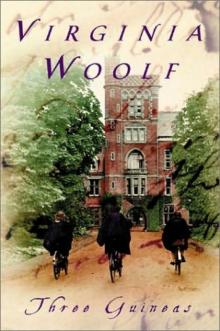 Three Guineas
Three Guineas Flush
Flush Mrs. Dalloway
Mrs. Dalloway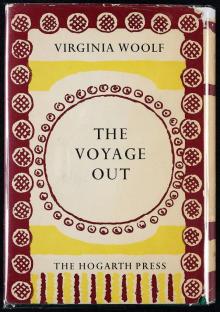 The Voyage Out
The Voyage Out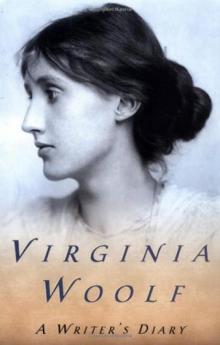 A Writer's Diary: Being Extracts From the Diary of Virginia Woolf
A Writer's Diary: Being Extracts From the Diary of Virginia Woolf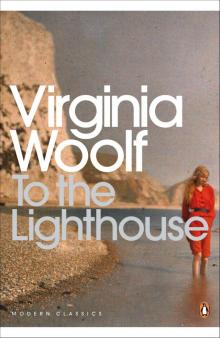 To The Lighthouse
To The Lighthouse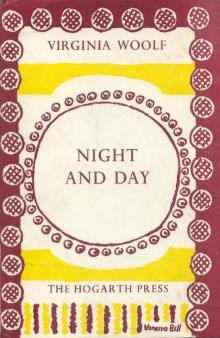 Night and Day
Night and Day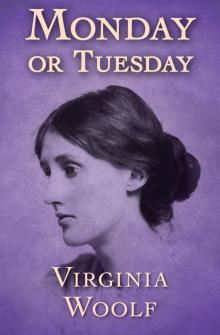 Monday or Tuesday
Monday or Tuesday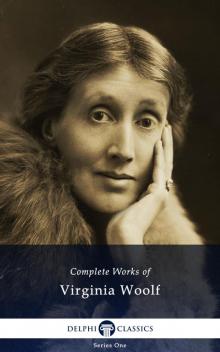 Complete Works of Virginia Woolf
Complete Works of Virginia Woolf Orlando
Orlando Genius and Ink
Genius and Ink Mrs. Dalloway (Annotated)
Mrs. Dalloway (Annotated) Jacob's Room
Jacob's Room THE RUSSIAN POINT OF VIEW
THE RUSSIAN POINT OF VIEW A Writer's Diary
A Writer's Diary Woolf Short Stories
Woolf Short Stories